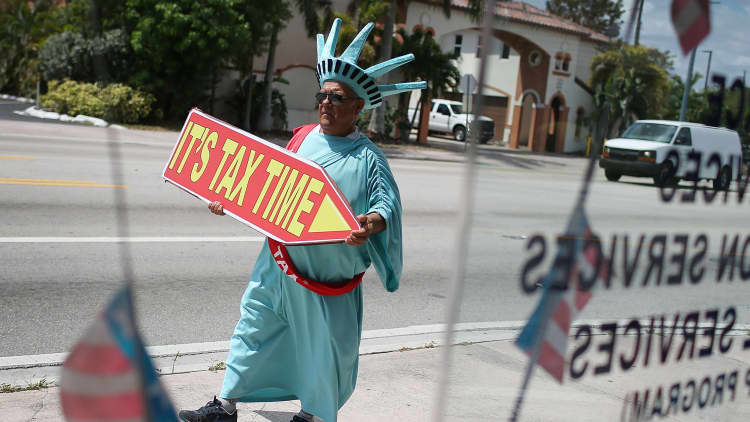Taxes are due early next week and, if you don't file and pay your taxes, you could face some consequences.
Everyone's tax situation is different, but here are some of the things that might happen if you don't submit your 2017 tax returns by the filing deadline of Tuesday, April 17.
First, there are different penalties for not filing your taxes and not paying them, says Lisa Greene-Lewis, certified public accountant and TurboTax blog editor.
- If you don't file, you'll face a failure-to-file penalty. The penalty is 5 percent of your unpaid taxes for each month your tax return is late, up to 25 percent. Plus, if you file more than 60 days late, you'll pay a minimum of $135 or 100 percent of the taxes you owe (whichever is less).
- If you file your taxes but don't pay them, the IRS will charge you a failure-to-pay penalty. The penalty is far less: Generally, the IRS will charge you 0.5 percent of your unpaid taxes for each month you don't pay, up to 25 percent. Interest also accrues on your unpaid taxes. The interest rate is equal to the federal short-term rate, plus 3 percent.

In short, even if you're only a couple of months behind on your taxes, the consequences can pile up, thanks to fees and interest. And you may miss out on a refund by not filing. After all, "the IRS reports every year that they have close to $1 billion in unclaimed refunds," says Greene-Lewis. "And those refunds are averaging about $700. That's a lot of money."
Even if you can't pay your taxes, file. "In most cases, the failure-to-file penalty is 10 times more than the failure-to-pay penalty," the IRS reports. You can always apply for a payment plan with the IRS to resolve your tax debt.
If you continually ignore your taxes, you may have more than fees to deal with. The IRS could:
- File a notice of a federal tax lien (a claim to your property)
- Seize your property
- Make you forfeit your refund
- File charges for tax evasion
- Revoke your passport
Now that you're inspired to get started on your 2017 tax returns, if you haven't done so already, read up on the common errors that can slow down the filing process.
This is an update of a previously published story.
Video by Jonathan Fazio
Like this story? Like CNBC Make It on Facebook!
Don't miss: How an H&R Block tax preparer spends his 11-hour days during tax season




